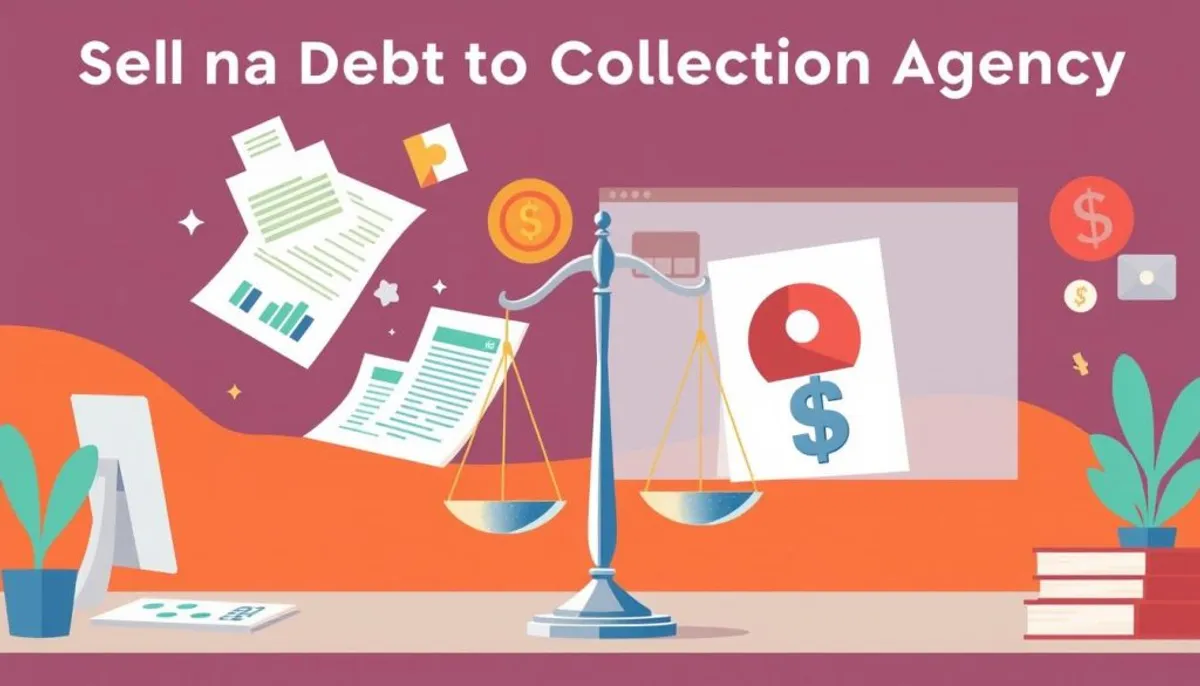Selling delinquent debts to debt collection agencies can be a shrewd strategy for businesses aiming to recover funds. This guide will lead you through the process of debt recovery services and the intricacies of debt sales.
Debt collection agencies are pivotal in the financial landscape. They acquire past-due accounts or act on behalf of creditors to reclaim unpaid debts. The Fair Debt Collection Practices Act oversees their actions, ensuring debtors are treated fairly.

Engaging in debt sales can yield higher returns than traditional collection methods. Entities such as collection agencies, law firms, and funds engage in debt buying. Eligible debts include credit card balances, medical bills, and auto loans, regardless of their age.
Key Takeaways
- Debt sales can provide immediate cash flow for businesses
- Collection agencies specialize in recovering various types of debt
- The Fair Debt Collection Practices Act regulates debt collection activities
- Selling debt can reduce legal risks and improve business ratios
- Professional debt buyers must possess proper licenses and adhere to industry standards
Understanding Debt Sales and Collection Agencies
Debt sales and collection agencies are pivotal in the financial sector. They focus on retrieving unpaid debts through diverse strategies. This process is governed by intricate legal frameworks and specific practices.
What Defines a Debt Collection Agency
A debt collection agency is a business dedicated to pursuing payments from individuals or businesses with outstanding debts. They employ tactics like phone calls, letters, and legal action to recover funds. Notably, debt collectors must send a written notice within five days of initial contact, as mandated by the Fair Debt Collection Practices Act.
The Role of Third-Party Collectors
Third-party debt collectors act on behalf of original creditors or purchase debts outright. They charge a percentage of the recovered amount, typically between 25% to 50%. In some instances, these agencies may negotiate settlements for less than the full amount owed. The industry is evolving, with digital tools enhancing compliance and consumer experiences.
Legal Framework for Debt Sales
The legal framework for debt sales is intricate. The Fair Debt Collection Practices Act regulates collection practices and safeguards consumers from abusive tactics. State-specific regulations also apply, with varying statute of limitations for debt collection. Consumers can receive up to $1,000 in damages if they prevail in a case against a collection agency for violating rules.
| Aspect | Details |
|---|---|
| Debt Sale Value | Creditors may sell for less than full value |
| Credit Report Impact | Delinquent debt visible for up to 7 years |
| Collection Agency Fee | Typically 25% to 50% of recovered amount |
| Legal Protection | $1,000 potential damages for rule violations |
Grasping the complexities of debt portfolio sales and the role of third-party debt collectors is crucial. This understanding aids both creditors and debtors in navigating the intricate debt recovery landscape. It ensures compliance with relevant laws and regulations.
Types of Debt Eligible for Sale
Debt buyers and consumer debt purchasers are pivotal in the financial landscape. It is vital to comprehend which debts can be sold to collection agencies. This knowledge is crucial for both creditors and debtors. Let’s examine the key factors that determine which debts are eligible for sale.
Secured vs. Unsecured Debt
Debt buyers generally focus on two primary categories of debt:
- Secured Debt: Loans secured by collateral (e.g., mortgages, auto loans)
- Unsecured Debt: Loans without collateral (e.g., credit cards, personal loans, medical bills)
Consumer debt purchasers predominantly target unsecured debts. These are more challenging to collect and offer higher potential returns.
Age and Status Requirements
The age of a debt significantly influences its eligibility for sale. Most debt buyers consider:
- Fresh accounts (30-90 days past due)
- Moderately aged debts (90-180 days past due)
- Older debts (180+ days past due)
Statutes of limitations vary by state, typically ranging from 3 to 6 years. This impacts the collectibility and value of older debts.
Documentation Needed for Sale
Proper documentation is essential for debt sales. Consumer debt purchasers require:
- Original credit agreements
- Account statements
- Payment histories
- Debtor contact information
This documentation ensures legal compliance and enhances the debt’s marketability.
| Debt Type | Typical Age Range | Key Documentation |
|---|---|---|
| Credit Card | 30-180 days past due | Card agreement, statements |
| Medical | 90+ days past due | Billing records, insurance info |
| Personal Loans | 60-120 days past due | Loan contract, payment history |
How Do I Sell a Debt to a Collection Agency
The process of selling debt to a collection agency is intricate. This guide aims to simplify the steps involved in delinquent account sales. It is designed to assist you in navigating this complex terrain effectively.
Preparing Your Debt Portfolio
Initiate by organizing your debt portfolio. Collect all necessary documentation, encompassing account details, payment records, and original agreements. This meticulous preparation is essential for seamless delinquent account sales.
Finding Reputable Buyers
Seek out debt purchasing firms with a proven track record through professional bodies like RMAI or ACA International. These organizations uphold rigorous standards, ensuring ethical conduct in debt collection.

Negotiating Terms and Pricing
During negotiations, consider the debt’s age, type, and potential for collection. Debt buyers often acquire delinquent debt at a fraction of its face value, sometimes mere cents. Be ready to discuss terms that are mutually beneficial.
| Debt Type | Average Price | Collection Timeframe |
|---|---|---|
| Fresh Credit Card Debt | $0.10 – $0.15 per dollar | 1-3 years |
| Older Credit Card Debt | $0.02 – $0.05 per dollar | 3-7 years |
| Medical Debt | $0.05 – $0.10 per dollar | 2-5 years |
It’s crucial to remember that debt collectors operate under strict guidelines. They cannot contact debtors before 8 a.m. or after 9 p.m. They are also restricted to seven calls within a seven-day span post-initial contact. These rules safeguard debtors and uphold ethical standards within the industry.
Benefits of Selling Debt to Collection Agencies
Engaging with collection agencies for debt sale presents significant advantages for enterprises grappling with charged-off loan portfolios. This collaboration enables businesses to access immediate capital, thus freeing up resources for their core activities.
The primary advantage lies in the rapid monetization of debts. Unlike the prolonged wait periods associated with in-house recovery, businesses can receive upfront payments for their outstanding accounts. This financial influx is pivotal for reinvesting in growth or loan origination.
Outsourcing debt collection to specialized agencies also diminishes operational costs and efforts. This shift allows companies to optimize their processes and allocate resources more effectively, streamlining their operations.
- Improved business ratios and financial health
- Market benchmarks for non-performing loan portfolio values
- Reduced legal risks in debt collection efforts
- Enhanced focus on customer acquisition and service
The act of selling debt offers invaluable insights into lending practices. It uncovers shortcomings in loan issuance and debtor scoring, guiding businesses to refine their strategies and prevent future defaults. This data-driven approach fosters more informed decision-making and robust portfolio management.
| Aspect | In-House Collection | Debt Sale to Agency |
|---|---|---|
| Time to Cash | Months to Years | Immediate |
| Resource Allocation | High | Low |
| Legal Risk | High | Reduced |
| Market Insights | Limited | Comprehensive |
By tapping into the expertise of debt recovery services, businesses can enhance their financial performance while preserving customer relationships. The specialized knowledge of collection agencies in managing charged-off portfolios ensures a professional and compliant debt recovery process.
Managing Risk in Debt Sales
The process of selling delinquent debts to debt collection agencies requires meticulous risk management. Banks and creditors must navigate through various risks, including operational, reputational, compliance, and strategic ones. This is essential when engaging in debt sales.
Due Diligence Requirements
Conducting thorough due diligence is critical when selecting debt buyers. It involves evaluating potential buyers’ compliance history, collection strategies, and technological capabilities. This step is vital to mitigate risks related to inaccurate account information and potential fraud.
Compliance Considerations
Compliance with laws and regulations is paramount when selling delinquent debts. Ensure adherence to the Fair Debt Collection Practices Act and state-specific rules. Implement robust monitoring systems to track contractual terms and maintain oversight post-sale.
Protecting Your Business Reputation
Protect your company’s image by partnering with reputable debt collection agencies. Consider adding clauses to prevent debt resale if necessary. Proper documentation transfer minimizes liability risks and preserves client relationships.
Remember, successful debt sales balance financial gains with risk management. By implementing these strategies, you can navigate the complexities of selling delinquent debts while protecting your business interests.
Alternative to Collection Agencies: The ti3 Platform Solution
Seeking effective debt recovery services without resorting to selling your debt to a collection agency? The ti3 platform presents a novel method for managing overdue accounts. It tackles the significant challenge of late payments, a problem affecting 89% of small-to-medium enterprises.

Automated Payment Recovery
Ti3’s automated system revolutionizes the debt recovery process. Given that 65% of businesses dedicate 14 hours weekly to payment tasks, ti3’s efficiency is transformative. It sends timely reminders, enhancing the likelihood of prompt payment. It’s worth noting that invoices with clear due dates are 8 times more likely to be paid on time.
Client Relationship Preservation
Unlike traditional collection methods, ti3 prioritizes preserving client relationships. This is vital, as 25% of small businesses face closure due to payment issues. Ti3’s approach is both gentle and effective, safeguarding valuable business connections while recovering debts.
Cost-Effective Collection Methods
Ti3 presents a cost-effective alternative to traditional debt recovery services. Small businesses spend approximately £5,000 annually on late payment recovery. Ti3 significantly reduces these costs. It’s an efficient solution for the 40% of businesses lacking a defined debt recovery process.
With ti3, you don’t need to ponder, “How do I sell a debt to a collection agency?” Instead, you can manage overdue accounts effectively, maintain client relationships, and enhance your cash flow – all through one user-friendly platform.
Legal Considerations and Compliance
Understanding legal requirements is essential when selling debt to collection agencies. The Fair Debt Collection Practices Act (FDCPA) dictates the behavior of third-party debt collectors. This federal law is designed to safeguard consumers from exploitative collection methods.
Fair Debt Collection Practices Act
The FDCPA establishes guidelines for debt collection agencies. It bars practices deemed unfair, such as calling at inconvenient hours or contacting consumers at work without consent. Agencies must clearly identify themselves and provide detailed debt information upon communication with consumers.
State-Specific Regulations
States also impose their own debt collection laws, which can be more stringent than federal regulations. For instance, New York and California have specific mandates that debt collection agencies must adhere to. Familiarity with both federal and state laws is imperative for debt sellers.
Documentation Requirements
Adherence to documentation standards is critical for legal compliance. This encompasses:
- Original credit agreements
- Payment histories
- Debt validation information
- Collection attempts records
Maintaining accurate records is vital for the protection of both debt sellers and third-party debt collectors. It ensures that collection practices remain ethical and compliant with the law.
Maximizing Debt Sale Value
Selling debt portfolios can be a strategic move for businesses aiming to enhance their financial standing. To maximize the value of charged-off loan portfolios, several key factors come into play. Let’s explore strategies to enhance your debt portfolio sales.
The age and type of debt significantly impact portfolio value. Newer accounts typically fetch higher prices, with credit card debt often commanding premium rates. Comprehensive documentation, including complete account holder information and payment histories, boosts buyer confidence and portfolio worth.
Market timing is crucial. Economic conditions and industry trends influence buyer interest and pricing. Building long-term relationships with reputable debt buyers can lead to repeat sales and more competitive offers. Experienced buyers use proprietary data and modeling to accurately assess portfolio value, ensuring fair pricing.
| Debt Type | Relative Value | Key Factors |
|---|---|---|
| Credit Card | High | Recent activity, credit limits |
| Installment Loans | Medium | Payment history, remaining balance |
| Auto Deficiencies | Variable | Vehicle value, deficiency amount |
| Telecom Accounts | Low to Medium | Account age, service type |
By focusing on these elements, businesses can optimize their debt portfolio sales and achieve maximum value in the competitive debt buying market.
Conclusion
Selling debt to collection agencies can be a strategic move for businesses aiming to enhance cash flow and concentrate on core activities. It is essential to carefully evaluate the advantages and disadvantages when contemplating debt sale to a collection agency. The benefits include rapid cash recovery and diminished administrative tasks. Yet, the potential harm to customer relationships must be considered.
Debt recovery services provide more than mere account collection. They offer valuable insights, legal counsel, and customized solutions to fulfill specific business requirements. When selecting a collection partner, it is vital to assess their reputation, adherence to laws such as the Fair Debt Collection Practices Act, and their approach to customer interactions.
While debt sale can be a viable strategy, alternatives like the ti3 platform present automated payment recovery methods that maintain client relationships. The choice between selling debt or exploring other recovery avenues hinges on your business’s unique circumstances and objectives. By comprehending the process and examining all available options, you can make an informed decision that optimizes your company’s financial well-being and long-term prosperity.
RelatedRelated articles



